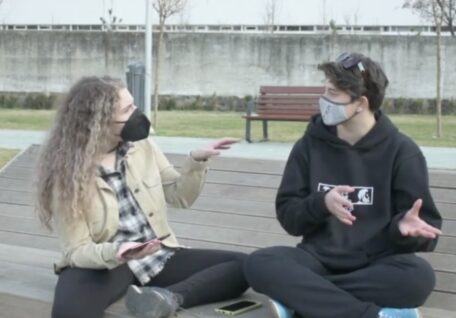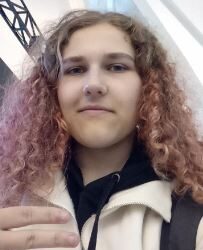Interview
YOU START WITH A STORY:
How to make your first film, according to a young filmmaker
Author: Bisera Gjurovska
In 2021 Bisera Gjurovska interviewed Leona Jarikj, at the time an up-and-coming young Macedonian filmmaker, as well as the rest of the crew engaged in one of the first Leona’s short films, called “Jinx.” With this interview, Bisera wanted to show how young people can make a successful short film, promote the crew for their endeavors as well as support young people in their aspirations.

The interview is divided into three video clips, each being focused to a particular topic related to the filmmaking experience and accompanied by a blog post with useful hints and links to “how-to” articles on the topic addressed in the post.
These articles should be taken not solely as an introduction to getting into filmmaking for young people but as a call to action for people of any age to do more research on the topic, pick up a camera, call up some friends, write down some ideas and make a short film. Or, if you’re not interested in creating films yourself, it’s a call to encourage others by sending them these articles or relaying this information to them.
Filmmaking isn’t just a fun, creative hobby, a way to make some money or an outlet through which you can tell a story – it’s also a way to develop competencies that help people, especially young people, in understanding concepts like peace, justice and cooperation as well as become more active citizens in this ever-changing world.
Watching films has been proven to help with emotional intelligence, communication skills and learning. Thus, it can be argued that making films would lead to similar benefits, if not many more. Filmmaking takes working in teams, further developing social, communication and cooperation skills. It can make one more aware of what motivates others, how to assign tasks, how to organise groups of people, how to articulate ideas to others, how to socialize and create a good work environment, etc. Filmmaking also requires creativity and innovative thinking. It requires finding creative solutions and compromises between your vision, the vision of your team and what’s possible in reality when it comes to how a scene is shot and acted, the format and content of the script and details like lighting, set and sound design.
Filmmaking obviously develops the filmmaker’s interest or skill in writing, acting, music, design, camera work and other elements related to creating films but it can also enhance their knowledge in unrelated areas. Filmmakers are encouraged to research the different elements of their story – if they’re making a crime film, then they might research criminology, the law or prison systems to portray the plot effectively, if the movie is a biography of a famous engineer, then they might research engineering, physics, history, etc., as these might be fields the subject of the film was interested in or worked in.
For all these reasons, it’s important to support young filmmakers, who have found not only a creative outlet and an interesting career but one that will improve skills we need more of today.
Further reading on emotional intelligence and skills developed through filmmaking:
- https://www.esgthereport.com/how-movies-about-emotional-intelligence-can-impact-your-personal-and-professional-lives/
- https://www.stage32.com/blog/how-to-become-an-emotionally-resilient-filmmaker-3120
- https://www.indeed.com/career-advice/career-development/why-filmmaking-is-important
- https://www.linkedin.com/pulse/how-filmmaking-can-enhance-student-learning-rishabh-saxena
- https://akademie.dw.com/en/new-perspectives-films-are-an-engine-for-development/a-60830723
Further reading on filmmaking:
- https://www.wikihow.com/Film-a-Movie
- https://www.nfi.edu/how-to-make-a-movie/
- https://fxhome.com/blog/film-production-process-step-by-step
- https://www.indiewire.com/features/craft/the-5-people-filmmakers-need-for-a-tiny-skeleton-crew-34424/
FUN FACT:
Both Leona and Bisera were active participants in the Giffoni Macedonia Film Festival, having been at numerous renditions of the event and having contributed to the lively discussions about the films as well as having both represented Macedonia at the International Giffoni Film Festival in Italy. They have also participated in the workshops organized by the Macedonian Giffoni Film Festival. Leona has participated in the filmmaking workshops and Bisera took part in workshops focused on writing and journalism. This is interesting to note, considering the roles that Leona and Bisera fill in this project, as filmmaker and interviewer respectively – showcasing the tangible results of these workshops.
Go to next parts of this blog post:
Part 1: Making movies as a young filmmaker with limited experience and resources
Part 2: How do young people get into the film industry?
Part 3: What does a young person need to know to edit a movie?
About the author:
Bisera Gjurovska
Age: 18
Country: North Macedonia
City: Skopje
School: Orce Nikolov
Juror in Giffoni Macedonia: 2022, 2021, 2020
Giffoni Experience Italy 2022

Do you want to be a part of the EPYC Blog?
The EPYC blog is a space where all young people can share their thoughts on topics related to the peacebuilding power of film and arts in general
Use the form to aplly for your EPYC space!
Tell us who you are and what you want to write about.
If your idea is alined with the vision of the EPYC blog, our team will contact you.
The EPYC Blog is curated and edited by Idea Artis.
Chief Editor: Stefan Mitikj
The views and opinions expressed by the posts within The EPYC Blog are those of the authors and do not necessarily reflect the official policy or position of Giffoni Macedonia Youth Film Festival and the EPYC project. Any content provided by our bloggers or authors are of their opinion and are not intended to malign any religion, ethnic group, club, organization, company, individual or idea/opinion.
The EPYC Blog does not participate in any type of affiliation program. Any link to third part content, including adds and promotional contents, is meant for informational purposes only.
